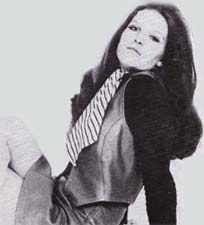The Early Years (2)
Written by Mark Hodkinson (OMUNIBUS PRESS)
*If you want to buy this book, go to Amazon.com!*

Jenny Fewins, The Opposition's Go Go Dancer.
Chapter 1 : Clucksville (p.15--p.17)
The Opposition fell together in the summer of 1965, before John had turned fourteen; this young age may explain his formal, remote manner at the time. They decided on the name simply because it was easy to remember. They were one of about for groups thriving in each school year at Beauchamp Grammar School. Leicester, like the rest of England, was clearly swinging. Fired by the chipper coffee bar pop of Herman's Hermits, Peter and Gordon, The Hollies, The Rockin' Berries, and, of course, The Beatles and The Rolling Stones, every teenager in the country had a guitar. Most strummed it a few times and then left it in the spare room, unable to fathom the re-tuning. Some, like the four members of The Opposition, saw it as an extension of their friendships and began to practice regularly.
John Deacon, or 'Deaks' as he was universally known, would seem an unlikely band member when he teamed up with his best friend from nearby Rosemead Drive, Nigel Bullen (drums), along with Richard Young (vocals/lead guitar) and Clive Castledine (bass). "John was quite keen," said Clive Castledine. "I was amazed with his academic background that he stuck with music. He was extremely intelligent and worked very hard at school. I think he took to learning the guitar in possibly the same way he looked at education. He was keen and did it properly."
John had been strumming the acoustic guitar he bought with his early morning paper round wages since the age of twelve, firstly with a school pal, Roger Ogden, with whom he'd play along to records. He was already proficient when The Opposition began scratching out covers of The Yardbirds, The Animals and Tamla Motown classics. Richard Young was the driving force behind the group; rehearsals were held at his parents' and since he was from a fairly wealthy background (his dad owned an electrical wholesaling business) he loaned the others money to buy equipment. From the start they each had quality gear: John's guitar cost £60 which he promised to pay back to Richard on a weekly basis. Richard had no qualms about lending the others money, especially John, since he knew John's mother would never consider buying him one; she would have seen it as an impediment to his studies.
The group was infused with a warm camaraderie. They took a bus ride to Leicester together and brought back pieces of Nigel's kit on the bus and Richard cycles home from Cox's music store in King Street with a Vox AC30 amp on the handlebars, unlikely as it may seem. They played for friends at a party at Clive Castledine's house in September 1965 and at a dance at Gartree High School soon afterwards. Their first authentic public performance was at the Co-operative Hall in Enderby in December 1965. They soon became regulars at youth clubs in the villages dotted around Oadby. Their image was clean-cut, usually running to ties and suits. "We weren't cool or weird or anything, it was before those sort of days," said Clive. "We had really short hair, it was well before everyone went hairy and weird."
Unfortunately, after barely ten months in tenure, it was apparent that Clive's musicianship was trailing the others, all of whom were surprisingly adept for their ages. "I was the least proficient, to put it mildly," he recalls. "They had to bang the bass playing into my head. My heart wasn't in it and I wasn't giving it my best by a long chalk. I was getting outside interests called girls and bikes." Richard Young would coach Clive painstakingly through his parts, only for him to forget them on stage and drift out of key. "We all had a gook idea about music except for Clive," says Richard. "He was a great chap but he had no idea at all. I once spent about two hours teaching him one song but he'd just play any old thing on stage. We had to sack him at the end." Unbeknown to anyone at the time, Clive's inept bass playing was a catalyst in John Deacon's journey to Queen. John had hitherto considered himself a guitarist, but magnanimously switched to bass to answer The Opposition's call. The moment was recorded in vivid detail in the band diary, fastidiously kept by Richard. The entry for April 2, 1966, reads: "We threw Clive out and had a practice in Deaks' kitchen with Deaks on bass - played much better."